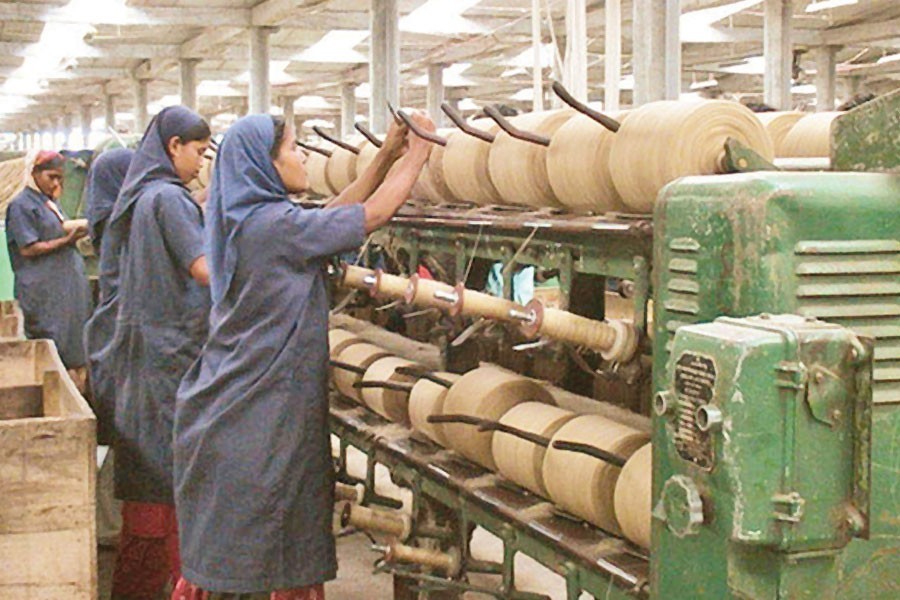
Published :
Updated :

The latest government decision to close down all the state-owned jute mills, unpalatable though, has been long overdue. The decision, undoubtedly, would render thousands of workers jobless in one of the most difficult times in human history. These mills like scores of other state entities have been causing serious haemorrhages to the country's economy for nearly four and a half decades. Poor performance on their part has led to the phased closure of most of the mills over the years (the Bangladesh Jute Mills Corporation (BJMC) had more than 70 mills soon after the independence, but the number came down to 25).
The BJMC, the controlling entity of state jute mills, has been in the red for 44 years out of 48 years of existence. Its accumulated loss over the last 10 years, according to an official estimate , was over Tk 100 billion.
The government being the ultimate owner of these mills has encountered lots of problems, intermittent workers' unrest being at the top of those. Only recently, had workers of a number of state jute mills taken to the streets and joined a fast-unto-death programme in support of the demand for paying their arrear wages.
Thus, these enterprises, instead of adding any value to the state coffer, have been a constant source of irritation for the government. The top policymakers have thought enough is enough and it is time to rid the economy of this trouble once for all. The cost involved in accomplishing the objective is not much, only Tk 50 billion, an amount equivalent to the financial loss these mills have been incurring over a period of five years.
However, the workers have nothing to do with the dismal state of the jute mills. Mismanagement and irregularities are widely blamed, but the hard truth is that each of these mills had turned into a piece of worthless junk long ago. Since the demand for jute goods had started declining with the inroad of cheap synthetic alternatives, the successive government lost interest in modernising these mills and continued to drag a burden. However, coming under pressure from the leading donor agencies such as the World Bank, the government transferred a number of jute mills to the private sector and closed down a few others, including the world's largest the Adamjee Jute Mills.
The experienced gained by the government from the transfer of state jute mills to the private sector has not been palatable. Some of those mills are closed now and their workers have been passing days in total uncertainty. The owners concerned, allegedly, sold the land and valuables and melted into thin air.
In contrast, the private jute mills that produce nearly 95 per cent of the country's jute products have been fetching profits for their owners in recent years following resurgence in demand for jute goods internationally. The government, from time to time, did spend money on balancing, modernisation and rehabilitation (BMRE) of some state jute mills but without any results. The funds had gone wasted because of faulty BMRE plans.
The government's decision to pay all dues in one go to the workers of the mills to be closed is a positive one. But the government cannot be oblivious of the bleak future staring in the face of thousands of workers who stand to lose their jobs. The regular workers and employees would get their arrears following the closure of the mills. But thousands of workers who work on daily basis will get nothing.
The government does have a plan to offer the jute mills to the private operators under the Public Private Partnership (PPP) arrangement. Yet such a plan is unlikely to deliver results if it is not a well-planned and research-based one. Here, the most important factor will be the selection of private partners who need to be honest, sincere and experienced in handling jute issues.
One state minister has told the media that the workers would get back their jobs when the mills would resume production under the PPP arrangement within the three months from the date of closure. That seems too much to expect. It is most likely to take a longer time to restart the mills under a different setup.
Though the demand for jute in the international market has been very unstable in recent years, relevant experts do see better days ahead as the developed world is becoming more and more inclined to using natural fibres. It is, however, important to modernise the existing jute mills so that those could meet the needs of the jute products of diversified nature.
It is easy to close down mills and factories by the stroke of a pen, but establishing new ones or modernising the existing ones does necessitate both resources and proper planning. Hopefully, the government has done its homework well this time.
zahidmar10@gmail


 For all latest news, follow The Financial Express Google News channel.
For all latest news, follow The Financial Express Google News channel.